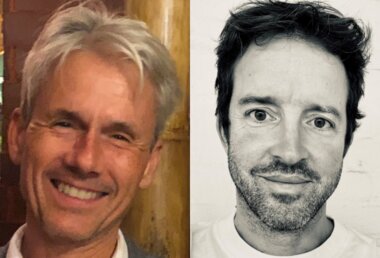31 January 2024
In its latest edition of ’60 seconds with’, King’s College Hospital NHS Foundation Trust (NHS FT) features the team behind the Mindfulness 4 All initiative (M4ALL).
Dr Florian Ruths (pictured on the left), Consultant Psychiatrist at South London and Maudsley NHS FT, and Dr Sam Spedding (pictured on the right), Consultant Clinical Psychologist at King's College Hospital NHS FT, discuss the programme and how it can be incorporated into your working day.
M4ALL is a mindfulness course with a large selection of relaxing and meditation videos that cover a range of common topics from self, others, work, and humanity. The course is available to all partnership staff and can be accessed via the King's Health Partners Learning Hub.
At KHP we are working to ensure we take a mind and body approach to all our activity. The M4ALL programme is one example of how the mind and body approach is being championed across the partnership.
Hi Sam and Florian, can you explain your roles please?
Sam (S): I'm one of the newer facilitators in the M4ALL programme. I use mindfulness in clinical practice and now I'm learning how to lead longer meditations.
Florian (F): I have been facilitating mindfulness staff groups for wellbeing, and patient groups around depression and anxiety for the last 20 years or so.
I am the lead of the South London and Maudsley NHS FT mindfulness service and I have delivered eight-week mindfulness programmes for junior doctors for the last five years. This programme is also being delivered as a two-day intensive retreat for doctors (and other health professionals).
Mindfulness interventions are recommended in the National Institute for Health and Care Excellence (NICE) guidance, for both staff and patients.
Can you tell us a bit more about M4ALL? How did it start?
F: M4ALL started at the beginning of the COVID-19 pandemic. We were trying to support our stressed and anxious frontline hospital staff with daily guided meditation practices, which were led online. We started with 30 minutes every day, which was well received. We then went to once per week after eight months.
Now we are delivering live M4ALL every other week on Wednesday mornings and it is open to all members of the public.
When and how do you meet?
S: I was introduced to the programme by my colleague, Sarah Walsh. She is a consultant dermatologist at King's College Hospital NHS FT and we met through our involvement in the Schwartz Round team. She was really passionate about it, and because of my interest in the clinical use of mindfulness I was excited to find out more.
F: We are now meeting online every other week on Wednesday mornings between 8:30 - 9am. Facilitators are always welcoming new colleagues who are getting involved in the programme.
What happens during the sessions?
S: There's a longer meditation led by one of the facilitators. Then there's a chance for people to feed back about their experience of the meditation. The feedback part is really important as it's here that everyone present is encouraged to think about their own practice through listening to other peoples' reflections. The sessions end with a shorter, three to five minute breathing meditation before we all go back to our busy days.
F: The themes of the sessions and the meditation techniques vary from session to session, we are trying to share different practices like breathing, walking and hearing meditations. We try to be topical with world events, for example we had a session on grief when Queen Elizabeth II died.
Another time, we connected to mindful playfulness when the Lionesses were in the World Cup final.
We use the short practice as a tool to take time out of our busy lives as a brief way of calming things down when they seem frantic.
Why is it important to practice mindfulness?
S: Generally, mindfulness practice is a proven way of gaining control of our minds. Personally, I find mindfulness is very beneficial for helping me to manage physical pain and stressful situations at work.
F: There is good empirical evidence, reflected by NICE, that mindfulness meditation reduces stress, anxiety and depressive features. This applies to staff in the workplace and our patients alike. Mindfulness can reduce the risk of burnout.
It is a form of looking after our emotions and hearts. We are all often better at looking after our bodies by exercising and eating well, but what about our hearts? We can take action to make our emotional well-being count.
How can staff get involved?
S: Anyone working within KHP can access the programme here - KHP Learning Hub (kingshealthpartners.org). The live sessions take place every other Wednesday morning at 8.30am and you can access the recordings afterwards.





